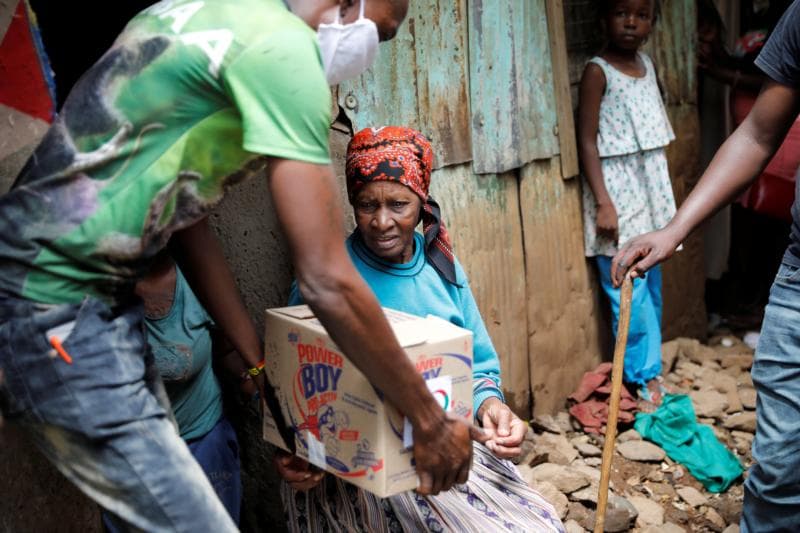WASHINGTON, D.C. — U.S.-based aid groups are devoting extra resources to refugees and migrant people globally who are vulnerable to the new coronavirus.
Efforts by Catholic Relief Services, Malteser International, Jesuit Refugee Service and AVSI-USA are focusing on basic education about the virus, sanitation and hygiene and boosting staff capacity to ensure an effective response to COVID-19, the illness caused by the virus.
The message being shared is the same as that in the developed world: maintain social distancing, wash hands, and cover sneezes and coughs. The lack of clean water and soap in many poor communities has made the work more difficult to carry out, however, agency officials said.
At the same time, Aid to the Church in Need announced it will provide $5.5 million in emergency funding to priests and nuns who care for the most vulnerable communities around the world but who have lost their own basic means of subsistence because of the pandemic.
Sean Callahan, CEO and president of CRS, said in a statement that the agency, which is the U.S. bishops’ overseas relief and development agency, is utilizing its relationships with partners around the world to respond as quickly as possible to the pandemic.
Particular emphasis is being placed on addressing the needs of older adults and vulnerable children, refugees and migrants, people with compromised immune systems and their caregivers, as well as other high-risk groups.
“Our COVID-19 response will draw upon our experience in acute health emergencies,” Callahan said, citing his agency’s work to respond to the Ebola outbreak in West Africa and the HIV crisis. “Our work will be informed by the local context and focus on some of the most vulnerable communities.
CRS has worked in Kenya to support training on infection prevention and control measures to help the health system in the capital of Nairobi contain COVID-19. The U.S. bishops’ overseas development and relief agency has particularly focused on training of health care workers in potential hot spots for the virus.
In Ethiopia, the focus has been on obtaining personal protective equipment and isolation tents for Catholic health facilities. In Cambodia, the effort has been on staying ahead of the disease before transmission of the virus becomes widespread.
And in the Gaza Strip, CRS is utilizing its database of more than 3,000 nurses from its internship program to provide surge staffing to health care facilities.
In a news release, ACN said its financial initiative will assist priests and nuns so they can continue carrying out their spiritual and social ministries, such as administering the sacraments, teaching the faith, caring for the sick and elderly, helping the poor and visiting prisoners.
ACN said the funding “will be a broad-spectrum intervention, targeting the Middle East, Central and Eastern Europe, Latin America, Asia, and Africa, through project support.”
“As a rising tide of human suffering related to COVID-19 makes itself felt around the world, the demand for social and spiritual care is soaring,” said Thomas Heine-Geldern, executive president of ACN, which is the international pontifical charity serving the persecuted Catholics around the world.
“It is our wish that this aid, made possible thanks to our donors, will help ease the burden on our courageous priests and nuns, who stand on the front lines, bringing God’s love and compassion to our suffering brothers and sisters,” he added in a statement.
Other organizations have turned to offering greater aid and taking steps to minimize the spread of illness.
Jesuit Refugee Service reported that it was helping hospitals transport supplies to communities in greatest need, distributing medicine and hygiene supplies, providing cash support, offering basic needs assistance, and educating people about the illness and the necessity of social distancing practices.
The agency also said it has boosted its advocacy for refugee rights and protection during the pandemic.
Malteser International, based in New York City, has undertaken efforts to help people on the move protect themselves against the highly infectious illness, particularly in Colombia, Peru, Haiti, Lebanon, Bangladesh, Afghanistan, Pakistan, Congo and Uganda.
Aid workers with AVSI-USA also said its staff members have emphasized the importance of good hygiene practices throughout camps and vulnerable communities.
The agency expressed particular concern for people in Syrian camps who have been displaced for years because of the country’s long civil war.
In Uganda, agency representatives have joined a task force to support health care teams in identifying possible COVID-19 cases, isolate people suspected of having the illness, provide funding for ambulances to ensure that samples from tests reach laboratories quickly and share basic prevention techniques to limit the spread of the virus.













